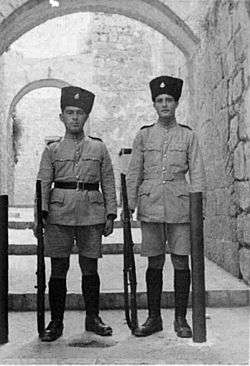Notrim
The Notrim (Hebrew: נוטרים, lit. Guards; singular: Noter) were a Jewish Police Force set up by the British in Mandatory Palestine in 1936 to help defend Jewish lives and property during the 1936–39 Arab revolt in Palestine.[1] The force was divided into Supernumerary Police and highly mobile Settlement Police.[1] Members were recruited almost entirely from the Haganah.[1]

As notrim thousands of young men had their first experience of military training, which Moshe Shertok and Eliyahu Golomb cited as one of the fruits of the Haganah's policy of havlagah (restraint).[2]
The British authorities maintained, financed and armed the Notrim until the end of the Mandate, even though they knew that although the force was nominally answerable to the Palestine Police Force it was in fact controlled by the Haganah.[3]
After World War II, the Notrim became the core of the Israeli Military Police.[1]
History in World War II
On 6 August 1940 Anthony Eden, the British War Secretary, informed Parliament that the Cabinet had decided to recruit Arab and Jewish units as battalions of the Royal East Kent Regiment (the "Buffs").[4] At a luncheon with Chaim Weizmann on 3 September, Winston Churchill approved the large-scale recruitment of Jewish forces in Palestine and the training of their officers.[4] A further 10,000 men (no more than 3,000 from Palestine) were to be recruited to Jewish units in the British Army for training in the United Kingdom.[4]
Faced with Field Marshal Rommel's advance in Egypt, the British government decided on 15 April 1941 that the 10,000 Jews dispersed in the single defense companies of the Buffs should be prepared for war service at the battalion level and that another 10,000 should also be mobilized along with 6,000 Supernumerary Police and 40,000 to 50,000 home guard.[4] The plans were approved by Field Marshal John Dill.[4]
The Special Operations Executive in Cairo approved a Haganah proposal for guerilla activities in northern Palestine led by the Palmach, as part of which Yitzhak Sadeh devised "Plan North" for an armed enclave in the Carmel range from which the Yishuv could defend the region and attack Nazi communications and supply lines, if necessary.[4] British intelligence also trained a small radio network under Moshe Dayan to act as spy cells in the event of a German invasion.[4]
See also
References
- Katz, 1988, p. 3.
- Shapira, 1999, p. 250.
- Kimmerling, 1989, p. 38.
- Israeli and Penkower, 2002, pp. 112-113.
Bibliography
- Katz, Sam (1988). Israeli Units Since 1948. Osprey Publishing. ISBN 0-85045-837-4
- Kimmerling, Baruch (1989). The Israeli State and Society: Boundaries and Frontiers. SUNY Press. ISBN
- Penkower, Monty Noam (2002). Decision on Palestine Deferred: America, Britain and Wartime Diplomacy, 1939-1945. London: Routledge. ISBN 0-7146-5268-7
- Shapira, Anita (1999). Land and Power: The Zionist Resort to Force, 1881-1948. Stanford University Press. ISBN 978-0-8047-3776-0
